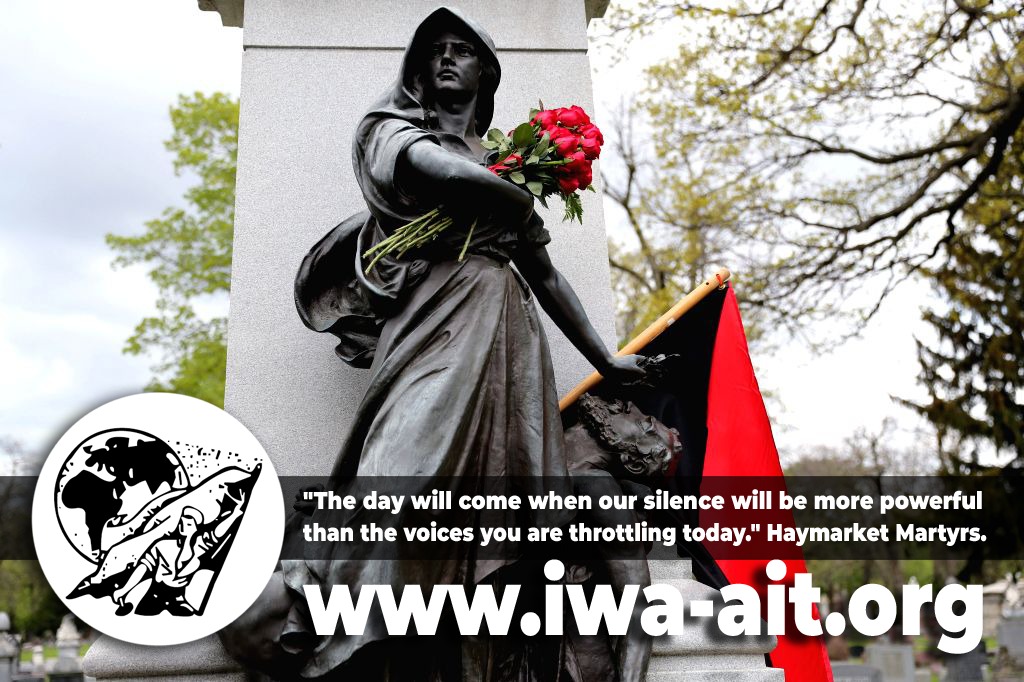
From the Secretariat of the IWA we make public this international declaration of solidarity with the workers of the world on May 1 in memory of the Martyrs of Chicago.
This year marks the 135th anniversary of the Haymarket revolt, Chicago (USA) in 1886, where the police and judicial authorities repressed the general strike called by the labor movement in defense of the 8-hour workday.
Despite the fact that the repressive process was finally culminated against eight workers, the repression was indiscriminate to the point that the police and judicial authorities arrested more than thirty workers accused of having participated in the Haymarket events, in which during a brutal repression of a workers' rally, an unknown man threw an explosive device against the ranks of the police, killing a mercenary.
A year later, in 1887, the repression was consummated with the murder by the United States of five working-class and anarchist militants who were executed by hanging, known internationally as the Chicago Martyrs: Albert Parsons (journalist), George Engel (printer), Adolf Fisher (journalist), August Spies (journalist) and Louis Lingg (carpenter). Two were sentenced to life imprisonment: Samuel Fielden (textile worker) and Michael Schwab (printer); and Oscar Neebe (salesman) was sentenced to fifteen years of forced labor.
In those years the workers' organizations extended and the ideas of the proletarian social revolution spread. Some years earlier, in 1864, the International Workers Association was founded in order to respond to the emancipatory aspirations of the internationalist labor movement. The voices silenced on the rope echoed around the world, making May Day an event commemorated by the international labor movement.
Once again, repression and persecution were the only responses of the State to stop the organization and worker agitation in defense of the eight-hour day and the general strike. However, and because it was impossible to repress an entire class for its aspirations and its struggles, the capitalist classes had to select a small number of worker militants to instruct the entire working class as a whole of their daring.
The repression in Chicago once again demonstrated the iniquity of capitalism against the labor movement, as well as a clear lesson in what can be expected from class enemies such as the state and capital. However, it represented and today also represents a flag, which is raised in defense of social justice and the emancipatory aspirations of the working class and anarchist ideas.
The murder of the Martyrs of Chicago in 1887 imprinted on the consciousness of millions of workers the injustice of capitalist society and made many organizations adhere to the ideals libertarians, but also that some intentionally forgot the ideas of which the Chicago Martyrs were supporters.
History has made it very clear that the workers' organization must remain outside the parties and organizations aimed at the conquest of political power.
The revolutionary syndicalism, that represented and represents a part of the labor movement, rejects all parliamentary activity and all collaboration with the powers of the State, because it understands that the suffrage only wants to offer a simulacrum of the right to the empire of lies, social injustices and capitalist plunder.
At the same time, he confesses himself a supporter of direct action, constituting the main means of struggle: strike, boycott, sabotage, etc. Direct action finds its deepest expression in the general strike, which must be, at the same time, from the point of view of revolutionary trade unionism, the prelude to social revolution.
From the torture and executions in the Montjuïc Castle in Spain and the forced labor in the concentration camps of Russian Siberia, to the gallows and the electric chair in the USA, repression is the instrument that the State and capitalism has used all times to repress the working class at the moment when it manages to become a danger to the privileges of the capitalist classes.
At present, the working class must make an even greater effort to achieve a sufficient degree of organization to defend and conquer better economic, political and social conditions from the class struggle and internationalism. For this reason, it is more necessary than ever to become aware, organize and fight under the principles of revolutionary syndicalism and the International Association of Workers.
Long live May Day! Long live IWA!
